Delaying second vaccine dose credited with saving ‘large number of lives’
Data from Public Health England suggests both the Pfizer and Oxford/AstraZeneca vaccines greatly reduce hospital admissions after a single dose.

The decision to delay second doses of Covid vaccines in an effort to jab more older people has been credited with saving a “large number” of lives, after data suggested hospital admissions are being greatly reduced by the rollout.
The “exciting” and “hugely reassuring” results from a Public Health England (PHE) study have indicated that the Pfizer and Oxford/AstraZeneca vaccines are highly effective in reducing infections.
Protection against developing symptomatic Covid-19 in the over-70s ranged between 57% and 61% for one dose of Pfizer and between 60% and 73% for the Oxford/AstraZeneca vaccine, the study found.
Over-80s who had been vaccinated with one dose of either jab had more than 80% protection against hospital admission, while the Pfizer jab was 85% effective at preventing death from Covid-19.
More data is being analysed on how the Oxford jab prevents death, while figures for the over-70s are expected shortly.
Professor Anthony Harnden, deputy chair of the Joint Committee on Vaccination and Immunisation (JCVI), said the “bold” decision to delay the second dose so more older people could be protected by a single dose more quickly had saved lives.
He said: “These real world results from Public Health England demonstrate a very good effect from both vaccines after the first dose.
“The Covid vaccination strategy was designed to prevent as many deaths as quickly as possible.
“The bold decision to vaccinate more older people by delaying the second dose has undoubtedly saved a large number of lives.”
Health Secretary Matt Hancock hailed the “exciting new data” as “extremely good news”.
He said the results may go some way to explaining why the number of Covid admissions to intensive care units among people aged over 80 in the UK have dropped to single figures in recent weeks.
Mr Hancock is due to address MPs on the latest coronavirus developments in the Commons on Tuesday, a date which marks 12 weeks since the UK vaccine rollout began.
Downing Street has committed to ensuring people receive their second jab within 12 weeks, a policy recommended by the JCVI.

Prof Van-Tam said the data “gives us those first glimpses of how, if we are patient, and we give this vaccine programme time to have its full effect, it is going to hopefully take us into a very different world in the next few months”.
Professor Paul Hunter, of the University of East Anglia, described the PHE study results as “hugely reassuring” and echoed praise for the decision to delay second doses.
He said: “This study gives very clear evidence that the UK strategy of delaying the second dose to allow more people to be protected by a first dose was the right approach to reduce the pressure on the NHS and reduce the number of deaths in this (older) age group.”
Professor Azra Ghani, chair in infectious disease epidemiology at Imperial College London, said those who have been jabbed should “feel reassured that they will be highly protected with one dose, but will also further benefit from their second dose regardless of which vaccine they received”.
Government data up to February 28 shows that of the 21,091,267 jabs given in the UK so far, 20,275,451 were first doses – a rise of 185,900 on the previous day.
A further 104 people died within 28 days of testing positive for Covid-19 as of Monday – the lowest daily figure since October 26 – while there were another 5,455 lab-confirmed cases in the UK.

Concerns remain around the worrying Manaus variant, but the Government has defended its border arrangements, with Mr Hancock saying home quarantine measures were already in place and travel restrictions on Brazil had been imposed before the hotel policy was implemented in mid-February.
PHE has identified six UK cases of the P1 variant first detected in the Brazilian city of Manaus – three in England and three in Scotland.
Dr Susan Hopkins, of PHE, said they were tracking “very closely” the new variant and are in the process of trying to track down the one person who is yet to be identified who is believed to have taken a test on February 12 or 13.
In Scotland, new “pop-up” blood donation centres are being launched to help a study into why some people become very ill with Covid-19 while others do not.
Researchers for the GenOMICC Covid-19 study said they need to recruit more people from all backgrounds across Scotland, and especially from the country’s South Asian and Pakistani communities.
Pop-up blood donation centres are now being set up in Glasgow and Edinburgh, with support from Muslim leaders, to make it easier for people to give blood samples to help the research.
In Northern Ireland, ministers have asked civil servants to finalise details of Northern Ireland’s lockdown exit strategy, and it is thought to be likely the plan will be made public on Tuesday.
In Wales, First Minister Mark Drakeford has said the the improving public health situation has opened up the possibility of restoring “other freedoms” at next week’s review of restrictions to go alongside the return to schools for all primary pupils.





